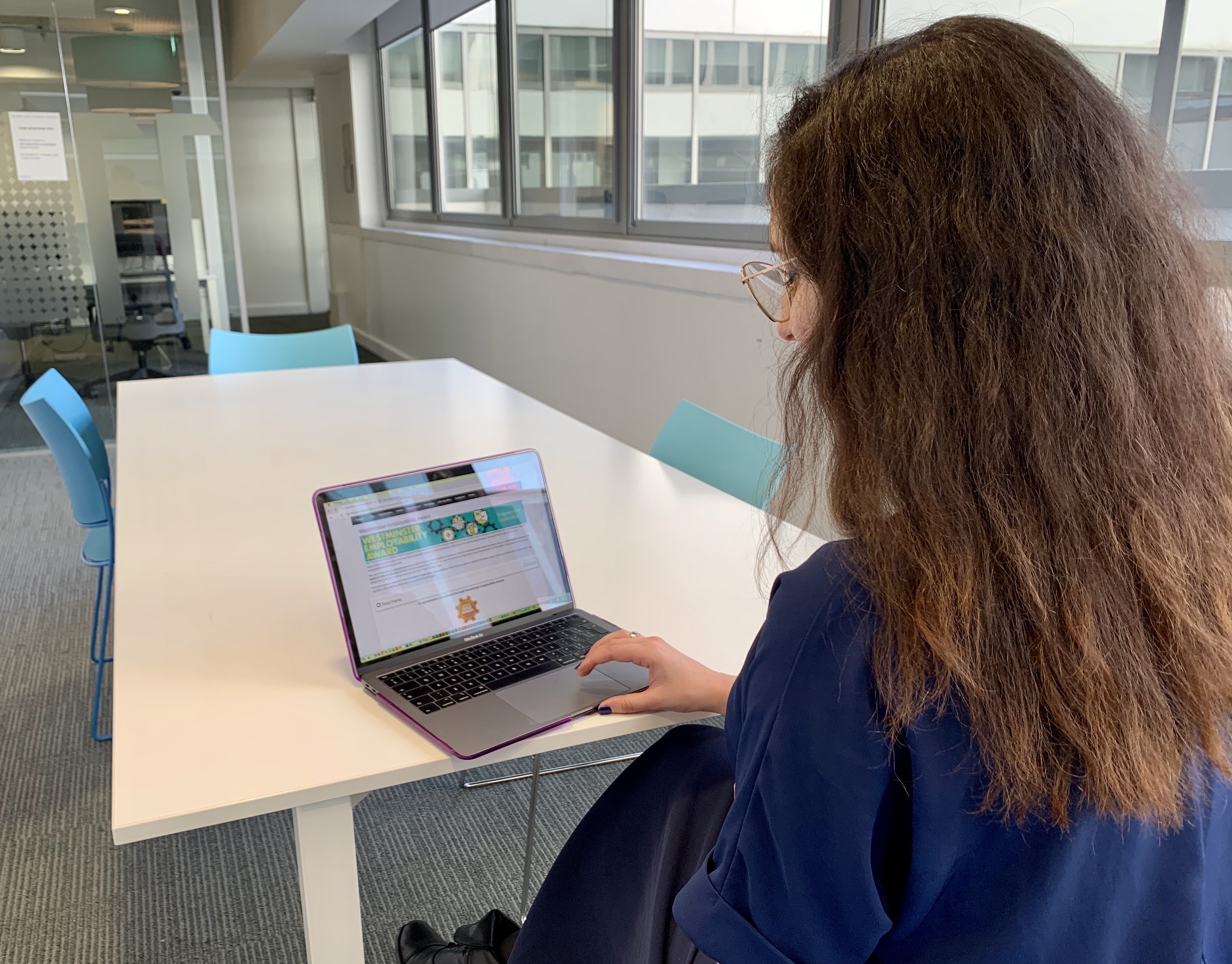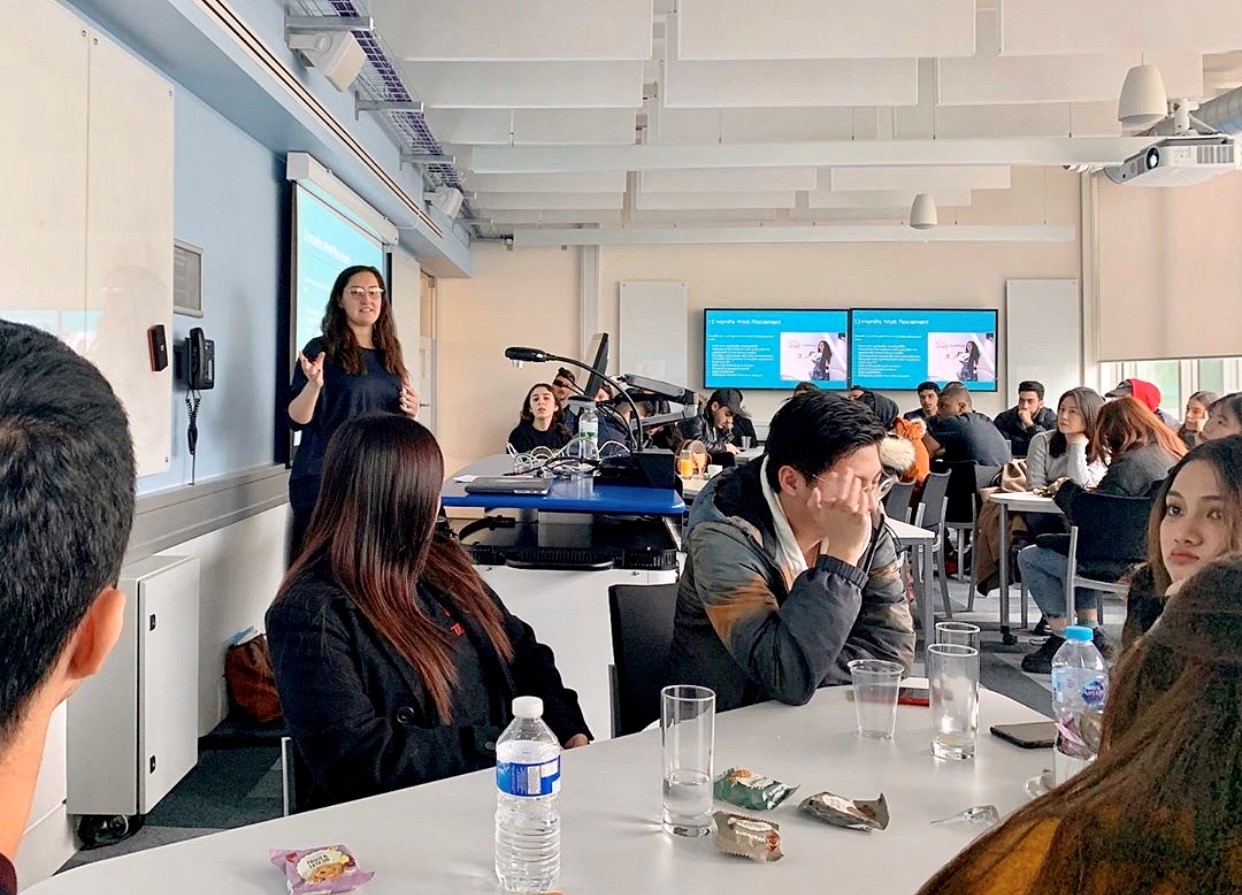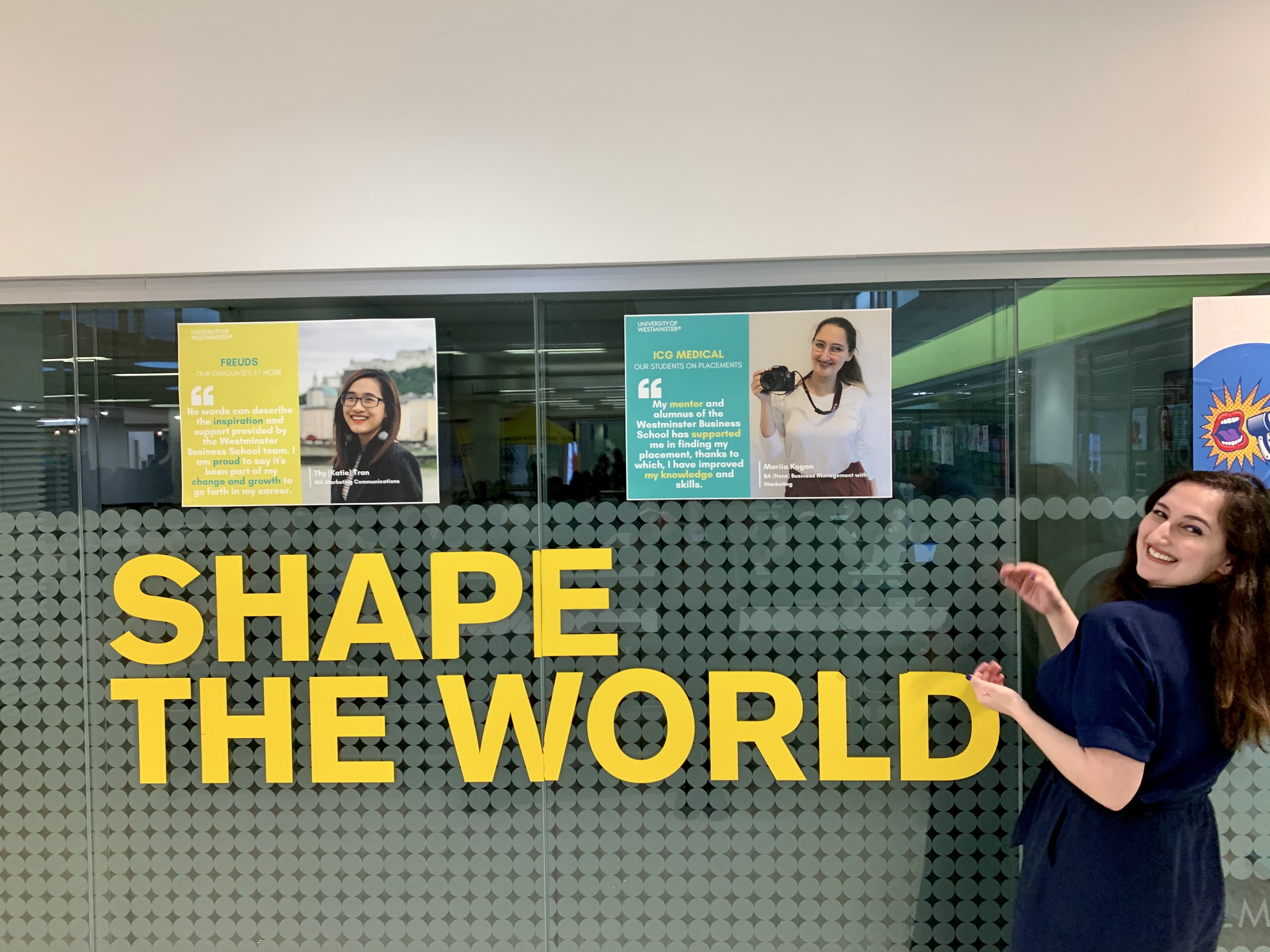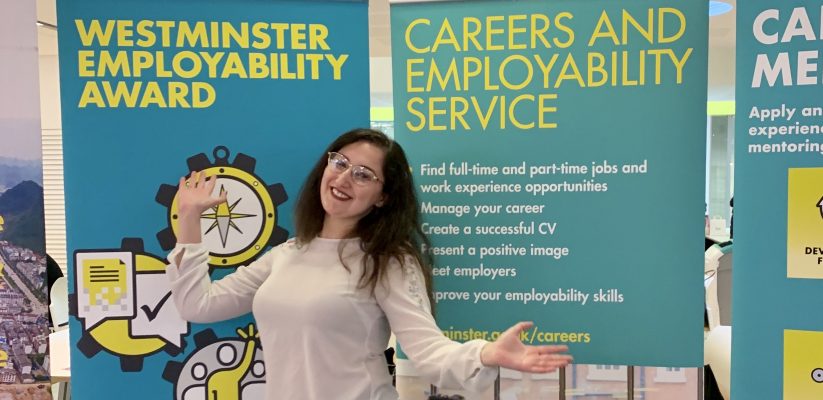Why did you decide to take part in the Westminster Employability Award?
Initially, I decided to take part in the award because I wanted to be aware of all the resources the University can provide me with to improve my employability. I knew that the way the award was designed could help me not only with professional development, but also with getting to know myself better. My hopes were that all of this could be really useful in terms of exploring my interests and making more mindful decisions about my career. All of these motivated me to try my best to complete as many activities as possible while learning how to reflect on new acquired skills and capabilities. So taking part in the award became not only a challenge, but a reward itself.
What skills would you say you have developed while taking part in the Award?
I think when talking about skills it is important to understand that the award is tightly connected to the Careers and Employability Services. It means that I have developed various skills both while taking part in all the activities (such as participating in the Mentoring Scheme, undertaking a Placement year or attending events) and doing the reflection part while completing the award itself. So if I talk only about the award, I would say that it helped me develop this ability to reflect and justify my conclusions and decisions. Overall, I feel that I gained confidence in myself, particularly when there is a need to talk about my experiences. While completing this award, I improved public speaking skills, became more familiar with interview techniques and psychometric tests, developed better interpersonal skills. I find it particularly useful now when I am applying for graduate positions, because I can formulate my experiences and present them much better. All of these really shaped me as a professional.

Which activity have you enjoyed the most? Why?
I found the skills audit to be particularly useful because justifying skills that you gained through actual experience is basically what you need to write about in a cover letter. Now I have a document with a list of skills that are all justified using the STAR model and I consult it often when applying for graduate positions.
In the ‘Explore the Options’ section of the award the focus is on events, and it has probably been my favourite part! I’ve been to various events both inside and outside the university. For example, I went to A Day With Goldman Sachs event this autumn and had the chance to ask employers questions and get tips on how to better approach the application process. The mock interview during this event was pretty insightful too.
How has taking part in the WEA has helped you to improve your employability?
Apart from what I mentioned before in regards to understanding my goals and interests better and practicing for interviews and psychometric tests, the award helped me to narrow my job search. I guess, a lot of final year students like myself can recognise that they are interested in, for example, marketing or HR. But the hardest part is to decide what to do with this interest, what to specialise in and what industry to choose. It is usually not the best strategy to just send out your CV to every job that is open, and I believe this award helped me to understand specifically what I liked before I started applying. For example, I would prefer to work for a company that offers a service rather than a product, I favour digital marketing over traditional forms of marketing and I am interested in higher education, non-profit and healthcare industries. All mentioned above narrows down my job search which means that when I apply for jobs, I know what I’m talking about and if I have the skills employers are looking for.
Additionally, during my last interview I realised how much the reflective part of the award prepared me for interviews. Now it is much easier for me to recall everything I have done throughout my degree and work placement in a structured way, especially when I use the STAR model!

Ok what is this STAR model you’ve been referring to? Because I don’t have a clue!
This is a storytelling model based on four stages: Situation, Task, Action, Result. It allows you to structure answers during an interview much better. Just to give a clue: if you were an employer who asked me to share an example where I showed good team working skills, here is what I would say:
“There have been numerous situations where I have shown good team working skills. For instance, when I was undertaking my placement, I worked on a project which was called “Voice of Nursing” – that’s the Situation. “Our Task was to film senior nurses all over the UK and to promote the videos in social media. The team consisted of the executive assistant, the CEO and myself, the marketing executive.” Then – Action. “To deliver the project we needed to work really well as a team and make sure that our communication was really concise and clear. As a Result, this allowed us to complete the project, we created 33 interviews, promoted these videos on our social media channels and generated 3,000 new Twitter followers which was a really good result in terms of raising brand awareness”. So you can see how using the STAR model makes your verbal communication in interviews better structured and you are less likely to slip up or forget anything.
You have attended many Careers and Employability Events as part of the WEA, which did you find most useful and why?
There have been many events that both my classmates and I really enjoyed. For example, when we were looking for a placement, we attended various workshops around assessment centres delivered by real graduate employers. I remember we had someone coming from a pharmaceutical company Pfizer who led the mock assessment center for us. This workshop allowed us to learn more about the hiring process in similar companies.
I also really loved the ‘interview clinics’ which worked like speed dating, but in a professional environment! The Careers and Employability Service team brings a lot of employers from different industries and students have a chance to spend around 5 minutes with them in a ‘speed interview’. I found it particularly useful because employers were providing us with feedback to get a well rounded understanding of what different companies look for and what skills and qualities we need to develop in order to succeed in future interviews.
I am also a big fan of the “What It Takes” series of events where Westminster alumni share their experiences, both personal and professional, such as the recent “ What it Takes to be a Successful Woman in Tech” event. It is a great place to learn about different career paths that are open for us Westminster students. It is also a chance to meet inspiring alumni: I’m still in touch with Keeran Gunnoo and Umarrah Javed who became real role models for me.
I also liked the “Meet your Mentor” event which is part of the Mentoring Scheme experience. Here, you can talk both to your Mentor and any other inspiring alumni who decided to dedicate their free time to help students like myself with the job search and provide guidance and advice.

How did you manage your time to complete the Award while also completing your studies? Can you give other students any tips?
First of all, I believe it is important to have good time management skills and, most necessarily, put yourself out there. The skills you learn during your degree are best developed when you are an active student and you try to grab every opportunity that you find available. So I would advise students to try as many new things during their studies as they can. Join the societies or start new ones, become FANS – friends of new students, find a Mentor, learn business consultancy with Westminster Business Consultants (WBC), assist with organising events, go on field trips. Opportunities here are endless, and it is possible to find time for it if you become more organised.
Apart from that, to finish this award you need to write about your actual experiences. It doesn’t require too much effort because you’re just writing about what you know. I started completing the award in my final year, but if you are a first or second year student who is considering taking part in the award I would recommend you to start earlier. Then you have more time to plan how to complete the activities at a leisurely pace rather than cramming it all into one year. This is how you can make sure that you don’t miss out on interesting opportunities, as I did with the Teaching Scheme or Talent bank because it was too late for me to join.
If I could go back, I would start completing the award during the first year by getting familiar with all the resources available, joining the Talent Bank, the Mentoring and Teaching Schemes, FANS, Students’ Union or societies. During the second year I would start searching for internships and placements and attend all the employability events, take part in the interview clinics, CV writing workshops and assessment center practices. Then in the final year I would focus on reflection.
Would you encourage other students to take part? And if so, why?
I would definitely encourage other students to take part in this award. I really enjoyed completing it and learned a lot from the process of reflection. This award is something that can help students like myself to develop necessary skills, become more successful with interviews, more confident in assessment centers or even find out what we are looking for in a career. Collecting points and moving up tiers from bronze to gold is a really fun bonus too and makes completing the award an enjoyable and motivating experience.
There are so many services that this award promotes, from the Mentoring Scheme (for which I am a crazy fan of), to the placement service, where career consultants can help students find a perfect one year placement. So even if you don’t achieve gold, you will still have a better understanding of everything the University offers students to help them become successful in the future. Taking part in the award allowed me to understand what I want to do after I graduate, and I feel inspired and ready for a new challenge. If you want to get the most out of your time at the university, I would certainly recommend learning more about the Westminster Employability Award.
Thank you for reading!
Thank you to Mariia Kogan, BA (Hons) Business Management (Marketing) student, for contributing this blog piece.
Click here to read more of the ‘Student Minds’ series. For more stories from Westminster Business School, click through to our blog.
